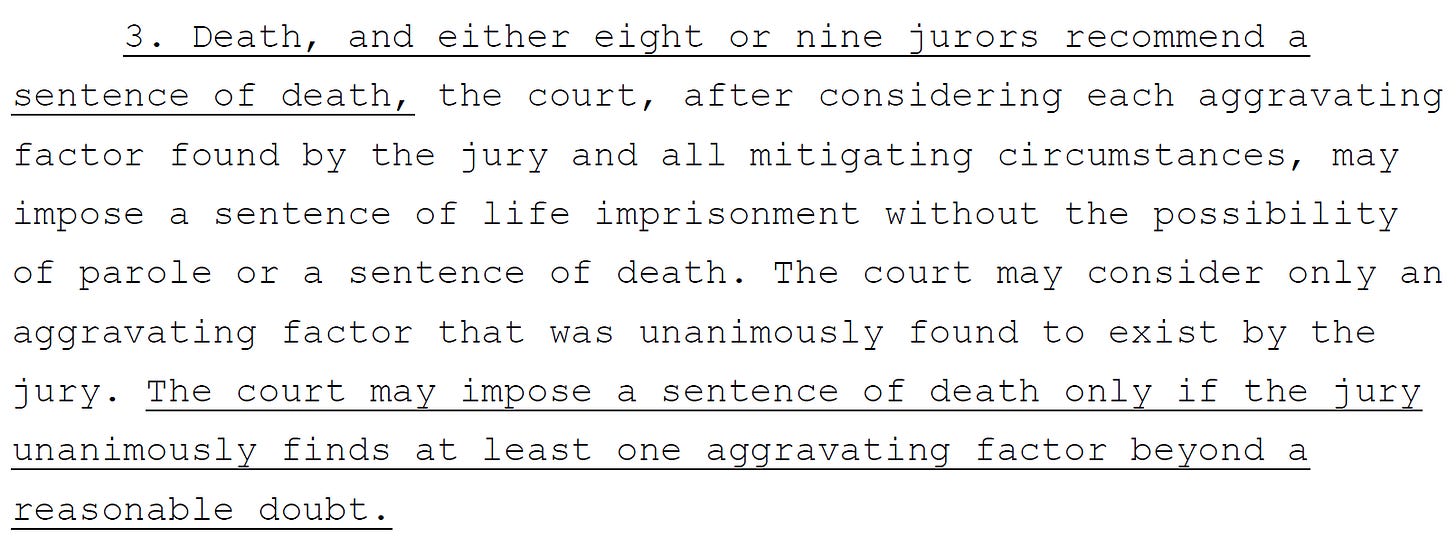Proposed legislation would impose the lowest standard in the country for capital sentencing.
Capital sentencing is at issue this legislative session. We will be tracking the legislation as it proceeds through the process.
When a defendant is convicted of first-degree murder in Florida, there are two possible sentences: (1) life in prison without parole, or (2) death. To determine the sentence, the jury must make a recommendation as to the appropriate sentence.
The trial is split into two phases: the guilt phase and the penalty phase. After the jury convicts the defendant in the guilt phase, the trial proceeds to the penalty phase, where the jury hears additional evidence of aggravation and mitigation.1 After hearing the evidence, the jury is asked to make certain considerations and ultimately recommend which sentence is appropriate.
A Brief History on Florida’s Current Statute
Until 2017, Florida’s capital sentencing statute required only a majority of the twelve-member jury to vote for a sentence of death (a vote of 7-5). The statute also made clear that the jury’s vote was advisory.
In 2016, the U.S. Supreme Court determined in a case called Hurst v. Florida that the statute violated capital defendants’ right to trial by jury under the Sixth Amendment to the U.S. Constitution:
The Sixth Amendment requires a jury, not a judge, to find each fact necessary to impose a sentence of death. A jury's mere recommendation is not enough.
The Court’s vote was 8-1 with only Justice Alito dissenting. As we’ll cover in a future post,2 this was an issue that had been plaguing Florida’s courts and defendants on Florida’s death row since 2002.
After Hurst and the fallout it created, the Florida Legislature enacted a new capital sentencing statute—which remains in place today. Under Florida’s current capital sentencing statute, a jury must vote unanimously make each determination necessary to sentence a defendant to death, which includes:
That the State proved each aggravating factor beyond a reasonable doubt;
That the aggravation is sufficient for a sentence of death;
That the aggravation outweighs the mitigation; and
That death is the appropriate sentence.
The Proposed New Statute
In late 2022, a Broward County jury voted 9-3 to sentence the defendant responsible for the horrific shooting at Marjory Stoneman Douglas High School (2018) in Parkland, Florida, to death. Under the current statute, the non-unanimous vote meant the defendant would automatically be sentenced to life in prison and could not be sentenced to death. As a result, the state erupted in outrage.
In response to the Parkland verdict, Governor DeSantis urged legislation that would make it easier to impose sentences of death in the State of Florida.
The key to this proposed legislation is removing the requirement for a jury’s unanimous vote for death before a defendant can be sentenced to death.
The Original Proposal
In early 2023, identical bills were filed in the House (HB 555) and the Senate (SB 450).
Under the original version of the proposed legislation, the bill reduced the necessary jury vote for sentencing a defendant to death from 12-0 to 8-4:
The legislation also stated in several instances that the jury’s recommendation was “advisory.”
Further, the original version provided for a judicial override of a jury’s recommendation for a sentence of life imprisonment without parole instead of death:
Amendment
On March 3, both bills were amended to (a) remove the jury override provision, and (b) remove the “advisory” language.3 Under the Amendment, the jury vote was still 8-4:
The Amendment also stated that if at least 8 jurors vote for a sentence of death, the judge was required to impose a sentence of death:
Amendment to the Amendment
Shortly before the Senate Committee hearing on the proposed legislation on March 6,4 an Amendment to the Amendment was filed to the Senate bill. Under this most recently proposed language, a judge can sentence the defendant to death if at least 8 jurors recommend a sentence of death. However, the procedure is different depending on the number of jurors who vote for death.
If at least 10 jurors vote to recommend a sentence of death, the judge is required to impose a sentence of death:
If 8 or 9 jurors vote to recommend a sentence of death, the judge can impose a sentence of death but may also impose a sentence of life imprisonment without the possibility of parole:
How the Proposed Statute Compares
Twenty-four states retain the death penalty.5 In addition, three states have Governor-imposed moratorium on executions.
Of the states that retain capital sentencing, every state requires a jury’s unanimous recommendation for death before a defendant can be sentenced to death—except one. The only state that does not require a jury’s unanimous recommendation for death is Alabama, which requires a jury vote of 10-2 for death before a judge may impose a sentence of death. Therefore, if passed, this statute would impose the lowest standard in the country and make Florida an extreme outlier on capital sentencing.6
Also, no other state has this wishy-washy structure where there is an option for death under five circumstances—a vote of 8-4, a vote of 9-3, a vote of 10-2, a vote of 11-1, and a vote of 12-0.
What’s next?
The House is holding a Committee hearing this afternoon. The bills will proceed through the process. We’ll keep you updated.
Stay tuned.
We’ll take a deep dive into that in a future post.
We’ll take a deep dive into Hurst in another future post. There’s a lot to unpack here.
We will cover the Committee hearings in more depth in a future post.
State by State, Death Penalty Info. Ctr., https://deathpenaltyinfo.org/state-and-federal-info/state-by-state (last visited Mar. 7, 2023).









